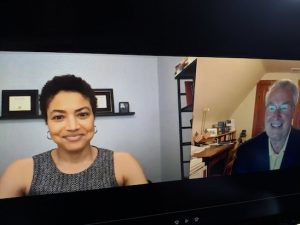As Beyoncé's use of Buffalo Soldiers imagery implies, Black Americans use their story to claim agency over their role in the creation of the country, said Alaina E. Roberts, a historian, author, and professor at the University of Pittsburgh who studies the intersection of Black and Native American life from the Civil War to present day. "The problem," she said, "is the Buffalo Soldiers were literally involved in not just the settlement of the [US] West but of genocide."
As Black people became ensconced in the western expansion, they experienced the same joys and tribulations as whites, a history unknown, even to many contemporary African Americans, said Alaina E. Roberts, a history professor at the University of Pittsburgh and author of "I've Been Here All the While," a study of Black people and Native Americans in the post-Civil War Era.
If you’re paying attention to pop culture right now, it certainly seems like Black cowboys are having a moment. From the recent Paramount+ hit "Lawmen: Bass Reeves" to Netflix’s "The Harder They Fall," our image of who was a cowboy in the Wild West is expanding. Alaina Roberts is a historian who studies intersection of Black and Native American life and author of the book "I’ve Been Here All the While: Black Freedom on Native Land." Roberts spoke with The Show about how some efforts are more successful than others, and more about the historical figure Bass Reeves.
Alaina Roberts, an American historian who wrote “I’ve Been Here All the While: Black Freedom on Native Land,” was raised with all the classic images of what a western film looked like: Davy Crockett wrestling a bear, John Wayne squinting through the Texas dust. Her mother loved those films. But when Dr. Roberts started her own career as a scholar, those weren’t the visions of the West that captured her imagination. Instead, she wanted to research stories of her own Black family members, who were enslaved by the Chickasaw and Choctaw tribes in what is now Ardmore, Okla. She also grew fascinated by the Buffalo Soldiers, all-Black regiments who policed the plains. “We shouldn’t be afraid of complexity,” said Ms. Roberts, 32, who consulted on the recent documentary series “The Real Wild West,” which focuses on Black and Hispanic cowboys, Buffalo Soldiers, Native leaders and women on the plains. “It doesn’t mean we’re trying to rewrite history."
The Real Wild West, premiering globally on June 29 on Curiosity Stream in the US along with partner channels worldwide, is the story of the American West – beyond the gunslingers and lawmen — where a diverse group of pioneers shaped a county and built the foundation for modern America. Meet the Black and Hispanic cowboys, female homesteaders, immigrants, and tribal leaders who faced unprecedented opportunity, ambition, fortune, and technological marvels to forge new paths across the wilderness. Directed and produced by Alex Sherratt and Sarah V Burns of Roller Coaster Road Productions (The History of Food, Sound Mysteries, Growing Up Hadzabe, The History of Home), The Real Wild West will cover several subjects and icons from across time, and features experts, authors, and historians, such as Dr. Alaina E. Roberts, award-winning African American, Chickasaw, and Choctaw author and historian.
"I had always known that Oklahoma was home to the “Five Civilized Tribes,” but I had not known much about the enslaved people they brought West with them. Alaina Roberts weaves her own family’s history into the history of Indian Territory and the state of Oklahoma, and made me rethink what I knew about African Americans in the West."
"As the historian Alaina E. Roberts recounts in I’ve Been Here All the While: Black Freedom on Native Land (University of Pennsylvania), the Five Tribes were effectively compelled to become settler colonists themselves, displacing Native groups in the West. They also brought with them enslaved Black people, thus further extending the reach of American chattel slavery beyond the Mississippi. In Indian Territory, what had been a set of highly varied, sometimes kin-adjacent forms of enslavement began to harden, and Indian attitudes and practices edged closer to those of white Americans."
"As the United States is becoming a country, they are creating a national culture, and slavery becomes an increasingly important part of that. So things like slaveholding are important to not just the accumulation of wealth, but also being a small, independent farmer. There were Native Americans with huge plantations, and there are people, you know, doing the cotton planting and picking, planting and picking corn."
Alaina Roberts, an assistant professor of history at the University of Pittsburgh and author of “I’ve Been Here All the While: Black Freedom on Native Land,” wrestles with the tension between the historical and popular culture depiction of Black cowboys. Her work uses archival research to connect “debates about Black freedom and Native American citizenship, to westward expansion on Native land.” She says that Black cowboys, who did various categories of work, were also a part of settling the West and its territories into the United States.
Native Americans adopted Black chattel slavery from Europeans as early as the 1500s, said Alaina Roberts, a University of Pittsburgh history professor. But these five specific tribes [the Cherokee, Chickasaw, Choctaw, Creek and Seminole] began assimilating into European-American culture in the late 1700s, including owning slaves as a way to accumulate wealth, she said.
The United States has had a bit of a problem with geography for *checks notes* its entire existence, ever since a bunch of refugees came over and, instead of asking for asylum, just took over. That’s a lot of ground to cover (sorry, I had to), so this book ["I've Been Here All the While"] just takes on a tiny bit of that history, exploring how the “40 acres and a mule” offer extended to newly freed slaves intersected with “Indian Territory” and the longstanding conflict between Native and white imperialists when it came to land and property and ownership. What I appreciate about this approach is that we typically view racial and cultural conflict or collaboration in the United States as a White people x [Insert minority group here] issue and not as interactions between two marginalized groups.
Alaina Roberts discussed her new book, “I’ve Been Here All the While - Black Freedom on Native Land,” in which she uses archival research and family history to reexamine the land rights of Indigenous peoples, freed African Americans, and white settlers during Reconstruction. This virtual program was hosted by The Newberry.
In fact, Alaina E. Roberts, an assistant professor at the University of Pittsburgh, writes in her book “I’ve Been Here All the While: Black Freedom on Native Land,” the freed slaves of five Native American nations “became the only people of African descent in the world to receive what might be viewed as reparations for their enslavement on a large scale.”
“I tell this story, a unification of Black, Native and white narratives, not only as a historian but also as a descendant of all four peoples: white settlers, Indian freedpeople, African Americans from the United States and Native members of tribal nations. On the one hand, it fills me with pride to think of the resilience of my Chickasaw and Choctaw forebears, who took a forced passage to a new land and turned it into an opportunity to create politically strategic and economically successful nations. And I feel honored to possess the rare legacy of historical Black landownership on the Roberts side of my family,” she writes in the book’s introduction.
Throughout history, the stories of some Black Americans have often gone untold, until recently. This weekend marks the 100th anniversary of the Tulsa Race Massacre. WTAE Listens to Alaina Roberts, an assistant professor of history at the University of Pittsburgh. She explores this dark chapter while shedding light on her own family’s story.
During and after enslavement in the United States, the West, and especially Indian Territory, represented freedom, possibility, and amelioration. Rumors that Indian nations would take in runaway slaves or that enslaved people in the Five Tribes—the Chickasaw, Choctaw, Cherokee, Creek, and Seminole Nations—were treated better than enslaved people owned by whites bred this mythology. While the truth behind these beliefs was far more complex, the West proved to be an attractive destination for an increasing number of Southern African Americans after emancipation.
"Owning slaves was a part of their strategy to assimilate into American society and it allowed them to be seen as different from other Native people and as more civilized," said Roberts, an associate professor of history at the University of Pittsburgh. Roberts tells the story of how Oklahoma became a melting pot and the decades of racial tensions that preceded the Tulsa Race Massacre in her new book "I've Been Here All The While: Black Freedom on Native Land."
When it comes to race, American history is a perpetual factory of both injustices and ironies. At the heart of Alaina E. Roberts’ “I’ve Been Here All The While: Black Freedom on Native Land” is this: The only formerly enslaved Blacks who received any kind of reparations after the Civil War were some of those individuals who’d been owned by Native Americans — the very Natives whom, decades earlier, the U.S. government had driven from the South into what’s now Oklahoma.
Roberts is a University of Pittsburgh professor specializing in the intersection of Black and Native American history. But that history is also one she lives, as the descendant of Creek and Chickasaw freed people who once inhabited that very land (though Roberts grew up in California). And it’s a slice of history that can help readers interpret a grim centennial: This May marks 100 years since the Tulsa Massacre, when mobs of whites killed hundreds of Blacks in Tulsa, Okla., and burned down the community known as Black Wall Street.
Nineteenth-Century Indian Territory (modern-day Oklahoma) was home to a wide array of groups including Native American Nations, enslaved Indian Freed-people, African Americans, White settlers, and others. In a conversation on Black Reconstruction in Indian Territory, Alaina Roberts discusses what Reconstruction might have meant for Black people in what is now called Oklahoma in the years immediately following the Civil War, and why it should be included in broader conversations about Reconstruction.
"With her first book, “I’ve Been Here All the While: Black Freedom on Native Land,” Roberts, an assistant history professor at the University of Pittsburgh, combines her family’s story with the broader story of Black Freedmen, the progeny of enslaved people who’ve lived in Native nations for centuries, and continue to do so to this day."
Pitt Assistant Professor of History Alaina Roberts says, of all the women in the windows, Pocahontas is her favorite. “She was an important intermediary between her people, the Powhatan, and British colonists in Virginia,” she said. “Pittsburgh has a rich and complicated colonial history on European-Native American relations, so it is fitting that a Native woman who did so much is depicted at one of our city’s landmarks.”
A candid interview with Alaina Roberts: My ancestors were Black and mixed race people... But I did not know that the owners were native people. So that was kind of a mind blowing thing to learn. And then to learn that my particular family’s history which is Chickasaw and Choctaw Indians is particularly under studied. A lot of the work done on Freedmen is on the Cherokees, sometimes Seminoles so I really wanted to kind of rectify that inequality and the sources.
Being Human Podcast / December 1, 2020

An interview with Alaina Roberts, professor of history at the University of Pittsburgh. The interview focuses on Professor Roberts' research and writing, in particular her forthcoming book I've Been Here All the While: Black Freedom on Native Land. Listen here or on Soundcloud
The late 1700s was "when the tribe really began to pick up on Black enslavement," said Alaina E. Roberts, an assistant professor of history at the University of Pittsburgh. The Creek Nation adopted chattel slavery as a strategic effort, Roberts said, to ally with white settlers by assimilating to their culture.
The Past, The Promise, and the Presidency / October 22, 2020

This podcast episode features the subject of Rutherford B. Hayes, the 19th president of the United States, a man whose name is synonymous with the end of Reconstruction and the rise of Jim Crow in the south. But perhaps his legacy isn’t quite that simple. Read more about Alaina's interview.
WVON 1690am: The Talk of Chicago / December 31, 2018

Listen to radio interview with Alaina E. Roberts on the show The Talk of Chicago.
“I think there’s a reasonable possibility that she will be a leading scholar in her field, if you want to look 10 to 15 years down the line. I think that would mean that she would have earned a reputation as a very original and thought-provoking scholar who looks at the problem of race in American history and in general,” said John Bodnar, IU Bloomington distinguished and chancellor’s professor of history.
In 2017, historians entered the fray. Immigration and ethnic history society scholars, especially, have been called to bring historical thinking and analysis to policy issues and public debates about immigration, citizenship, borders, white supremacy, and vulnerable and marginalized communities. Not only do scholars who study immigration history have subject expertise to share that can help us navigate today’s crises, but as educators and humanists, we are also bringing evidence, critical thinking, and knowledge to debates where they are often missing, in a context of epistemological uncertainty.














































